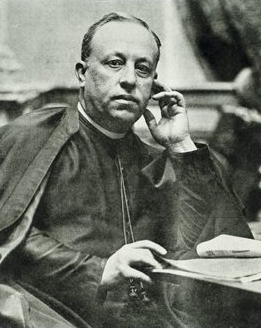Miquel Costa i Llobera facts for kids
Quick facts for kids
Miquel Costa i Llobera
|
|
|---|---|

Portrait of Miquel Costa i Llobera
|
|
| Born | Miquel Costa i Llobera 10 March 1854 Pollença, Spain |
| Died | 16 October 1922 (aged 68) Palma de Mallorca, Spain |
| Occupation | Poet and presbyter |
| Language | Catalan, Spanish |
| Nationality | Spanish |
| Alma mater | Pontifical Gregorian University |
| Genres | Poetry |
Miquel Costa i Llobera (born March 10, 1854, in Pollença, Spain; died October 16, 1922, in Palma de Mallorca, Spain) was a famous Spanish poet. He came from Majorca and mostly wrote in the Catalan language. Many people see him as a very important person in Catalan poetry.
Contents
Life of Miquel Costa i Llobera
Miquel Costa i Llobera was born in 1854 in Pollença, a town on the island of Majorca, Spain. His family owned land in the countryside. When he was eleven, he lost his mother. His uncle, a doctor in Pollença, helped raise him. His uncle taught him about the local nature and old classical books.
Early Studies and First Poems
Miquel learned from the writer Josep Lluís Pons i Gallarza. He studied in Madrid and Barcelona. There, he met another important writer, Antoni Rubió i Lluch. In 1874, he won an award at the Floral Games, which were poetry contests.
At first, he wrote romantic poems. His most famous poem from this time is Lo pi de Formentor (1875). This poem is about a pine tree in Formentor. Later, famous artists like Joan Miró were inspired by it. This poem was also in his book Poesies, published in 1885.
Love for Classical Writers
Miquel spent a lot of time reading old classical writers. He especially liked Horace and Virgil. In 1879, he wrote his famous poem A Horaci ("To Horace"). He sent it to his friends, including Antoni Rubió i Lluch. Rubió thought it was wonderful. He even sent it to a famous scholar, Marcelino Menéndez y Pelayo. Menéndez y Pelayo said Miquel's poem was one of the best and purest poems of its kind at that time.
Becoming a Priest and Later Works
In 1880, Miquel decided to become a priest. In 1885, he moved to Rome. He earned a special degree in theology from the Pontifical Gregorian University. In 1890, he returned to Mallorca.
In 1899, he published Líricas. This was his only book written in Spanish. It contained poems he wrote while in Italy, Madrid, and Mallorca. His friends and critics, like Juan Valera, really liked this book.
In 1902, he received the special title of Mestre en Gai Saber (Master of Gay Science) for his poetry. He also became a member of the Royal Spanish Academy.
Horacianes and Travel
In 1906, he published his most important collection of poems, called Horacianes. These poems were all about the Roman poet Horace. Miquel used very careful language and followed old classical poetry styles. The book had sixteen poems. They tried to copy the old Greek and Roman poetry styles in Catalan. People in Catalonia loved the book. Spanish critics also praised it.
That same year, he gave a speech at the Barcelona Floral Games. He also took part in an important meeting about the Catalan Language. In 1907, he published Poesies again, which was an updated version of his 1885 book.
Later in 1907, Miquel traveled to the Middle East, including Palestine and the Holy Land. He wrote a diary about his trip, which became the book Visions de Palestina (1908). In this book, he shared his feelings about visiting these holy places.
Final Years and Legacy
After some difficult events in Spain, Miquel wrote less. He published some religious writings and sermons. In 1919, he became a member of the Institute of Catalan Studies. He also translated works by famous writers like Virgil, Petrarch, Victor Hugo, and Dante Alighieri.
In 1922, Miquel Costa i Llobera died suddenly while preaching in Palma de Mallorca. He was buried in his family's tomb in Pollença. The town called him an "illustrious son." There is a process to make him a saint. In 2023, Pope Francis declared him a Venerable Servant of God, recognizing his heroic virtues.
Notable Works
- 1875: The Pine of Formentor
- 1885: Poesies ("Poems")
- 1885: Oda a Horaci ("Ode to Horace")
- 1897: De l'agre de la terra ("From the bitterness of the earth")
- 1899: Líricas (written in Spanish)
- 1900: La deixa del geni grec ("The legacy of the Greek genius")
- 1903: Tradicions i fantasies ("Traditions and fantasies")
- 1906: Horacianes ("Poems in the manner of Horace")
- 1908: Visions de Palestina ("Visions of Palestine")
- 1916: Sermons panegírics ("Panegyric sermons")
Translations:
- Himnes de Prudenci
Tributes and Recognition
Many places honor Miquel Costa i Llobera:
- In 1970, the Mossèn Costa i Llobera Gardens were created on Montjuïc mountain in Barcelona. This is a botanical garden named after him.
- Several schools in Spain are named after the poet. You can find them in Barcelona, Pollença, Palma, and Marratxí.
- In 2022, the town of Pollença declared it the Any Costa i Llobera (Costa i Llobera Year). This was to celebrate 100 years since his death.
Images for kids
-
Pollença, Miquel Costa i Llobera's childhood home
See also
 In Spanish: Miguel Costa y Llobera para niños
In Spanish: Miguel Costa y Llobera para niños
- Mossèn Costa i Llobera Gardens
- Catalan language poets
- Majorca
 | Janet Taylor Pickett |
 | Synthia Saint James |
 | Howardena Pindell |
 | Faith Ringgold |


